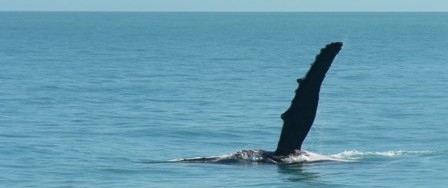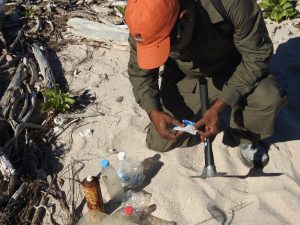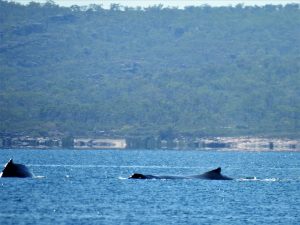 It wouldn’t be one of the planet’s most active wildernesses without a little mystery to keep us tuning in to how the whales are visiting Lulim and adjacent areas we survey.
It wouldn’t be one of the planet’s most active wildernesses without a little mystery to keep us tuning in to how the whales are visiting Lulim and adjacent areas we survey.From our point of view, the 2019 visitation of humpback whales to our areas, and as we understand, the western Kimberley, appear on our data to be a marked difference to the previous year.
All operators we talked to reported less whale sightings in the peak migration months of July-August.
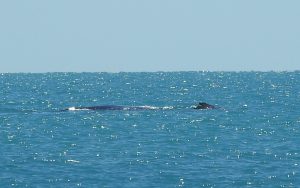 The Arraluli Whale Sanctuary Project conducted its survey of the areas inshore between Montgomery Reef and Lulim, concentrating on the corridor that runs parallel to the mainland, and going up as far as Deception Bay.
The Arraluli Whale Sanctuary Project conducted its survey of the areas inshore between Montgomery Reef and Lulim, concentrating on the corridor that runs parallel to the mainland, and going up as far as Deception Bay.General observations were less inshore visitors over a shorter visiting period.
Sightings of new born infants and mothers continue to predominate in these areas. There were plenty of mother and baby interactions, carrying out the behaviours associated with early training and socialisation of newborns.
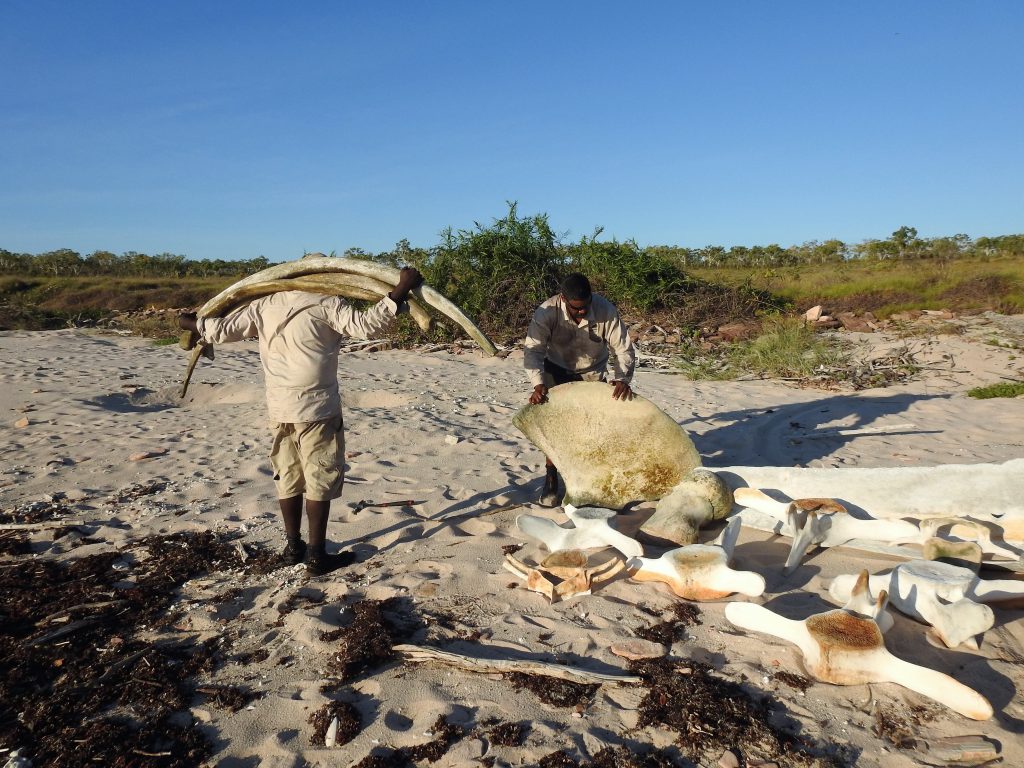 Remains of a large whale were found north of the camp. This may have been the large whale filmed last year heading towards this area, which is also a very sacred ground in the Lalai (Dreamtime) and for the Arraluli people, making this find of extra significance and contemplation of the deep spiritual foundations of our areas and the life that it is home to. Neil and team have been collecting the bones to prepare a resting place.
Remains of a large whale were found north of the camp. This may have been the large whale filmed last year heading towards this area, which is also a very sacred ground in the Lalai (Dreamtime) and for the Arraluli people, making this find of extra significance and contemplation of the deep spiritual foundations of our areas and the life that it is home to. Neil and team have been collecting the bones to prepare a resting place.
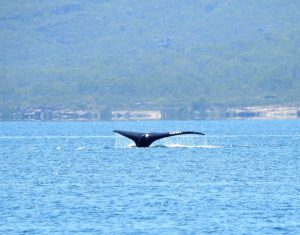 the season, there were still plenty of interactions with our team and also the private and charter vessels that move through the area who we communicate with.
the season, there were still plenty of interactions with our team and also the private and charter vessels that move through the area who we communicate with.Big bulls in impressive breaching behaviours, rogue infants roaming inshore areas for days at a time, much to the disapproval of their mothers, and the constant thrashing of tails and flippers as the early lessons in life are learned in the relative safety of the inshore waters. Family business continues in the ‘nursery’.
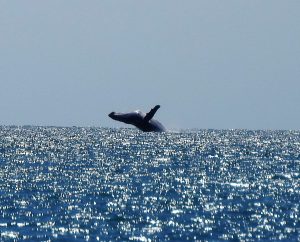 This season followed one of the driest ‘wet’ (monsoon) seasons in half a century, there was much less water flowing through the landscape out to sea as a result, affecting nutrient levels in inshore areas.
This season followed one of the driest ‘wet’ (monsoon) seasons in half a century, there was much less water flowing through the landscape out to sea as a result, affecting nutrient levels in inshore areas.Turtle sightings were strong as were reports from operators, indicating that the reef areas and islands remain a critical habitat for turtle conservation.
Mainland and island beaches remain important nesting places for turtles, which face disturbance from dingoes, crocodiles and humans.
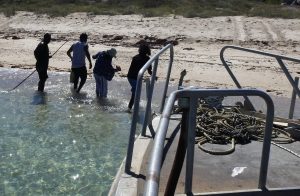 While dingoes continue to be a predator for turtle nests, this year we unfortunately saw a continued occurrence of domestic dogs being bought on to the nature reserves.
While dingoes continue to be a predator for turtle nests, this year we unfortunately saw a continued occurrence of domestic dogs being bought on to the nature reserves.
“This is one of the last places in the world these animals can live in the habitat as they have for too many thousands of years, why people want to bring their dogs into these areas doesn’t make sense,” Isobel says.
“It comes hand in hand to unauthorised access of our cultural areas, which is sadly a lack of respect for our culture and our land.”
Plastic debris along with other marine debris are a small but noticeable occurrence along the shores of Lulim.
This season shore patrols continued to log debris including plastic bottles of south east Asian origin.
The Arraluli clan supports all efforts here and globally to reduce plastic debris, which among other things, can be a hazard to marine life such as turtles.
Wijingarra welcomes more tours in 2019 season
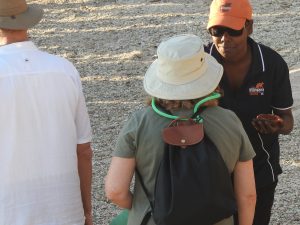 The 2019 season was enjoyed with charter vessels visiting country to undertake tours with the family business Wijingarra Tours.
The 2019 season was enjoyed with charter vessels visiting country to undertake tours with the family business Wijingarra Tours.“The person to person relationships myself and my children have made with the staff of these companies and the thousands of tourists from overseas and interstate, is real reconciliation in action, with many visitors saying meeting us is a main interest of coming to these areas,” Isobel says.
“These passengers highly value our culture. They want to meet us Aboriginal people in our country and know we are in our country working like this. It makes them happy that things are moving for us despite all the bad news they see and read about for our people.
“My family has scientifically been proven to have occupied this area for over 50,000 years right where we operate. My mother lived in this country. After being nearly wiped out as a people, and forced to live in a town that was not our tribal country, where things have gone bad for our tribe, we are back on the country and running a small business to support us manage visitors wanting to come to country.”
No unguided access is allowed to the sites that are open for tourism in Isobel’s areas, Raft Point, which is called Numbree, Freshwater Cove, which is called Wijingarra Butt Butt, and Langii.
Wijingarra guides meet the charter ships in country, and guests are welcomed with ochre on the beach and a welcome to country, taken to the caves and sites where they see palaeolithic rock art, and are told stories and connections of the Arraluli clan to this ‘art’, and a smoking ceremony is then provided on departure: “to get you all home safely,” Isobel says.
Visitors behaving badly
Sadly this year we had even more trespassers in country causing a bit of humbug.
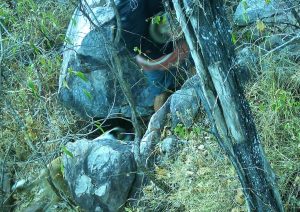 In some situations we understand it is the result of years of past behaviours leading to the expectation that trespassing to our cultural sites was the norm for visitors to our areas.
In some situations we understand it is the result of years of past behaviours leading to the expectation that trespassing to our cultural sites was the norm for visitors to our areas.One of our wildlife cameras picked up trespass at least once every three days for a month.
This even picked up dogs on what is a wildlife reserve and last refuge for many vulnerable native species. This can put stress on native animals and also cause harm to dogs.
Some trespassers have been less than polite, even interrupting our family tour business, though typically most are understanding when we explain that these places are to be visited with us as guides only, and support Aboriginal people running business just like anybody else.
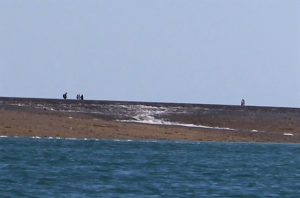 Ourselves as the only surviving Traditional Owners of the Yowjabaia people (my Grandfather’s mother’s people), do not like to walk on the reef unless we have a reason, which has to be culturally or scientifically important, and as always, with our consent, the Traditional Owners of this country, not some otherAboriginal people from some other place. It is best in this time and age we leave these places alone as much as possible for the benefit of the marine life. We are also considering the spirits and stories of our old people, who we are still mourning to this day.
Ourselves as the only surviving Traditional Owners of the Yowjabaia people (my Grandfather’s mother’s people), do not like to walk on the reef unless we have a reason, which has to be culturally or scientifically important, and as always, with our consent, the Traditional Owners of this country, not some otherAboriginal people from some other place. It is best in this time and age we leave these places alone as much as possible for the benefit of the marine life. We are also considering the spirits and stories of our old people, who we are still mourning to this day.
We look forward to working with the Marine Park board and industry and recreational groups to bring more awareness of the protocols in visiting country, including locations that can be visited within the park without guides.
We must all remember that our cultural places are our responsibility to protect, and we must manage them the best way we see fit. We thank everyone who has been cooperating and respecting our wishes.
